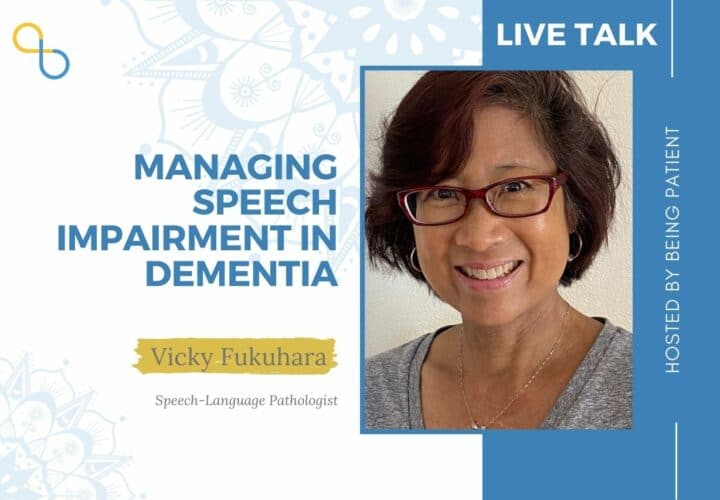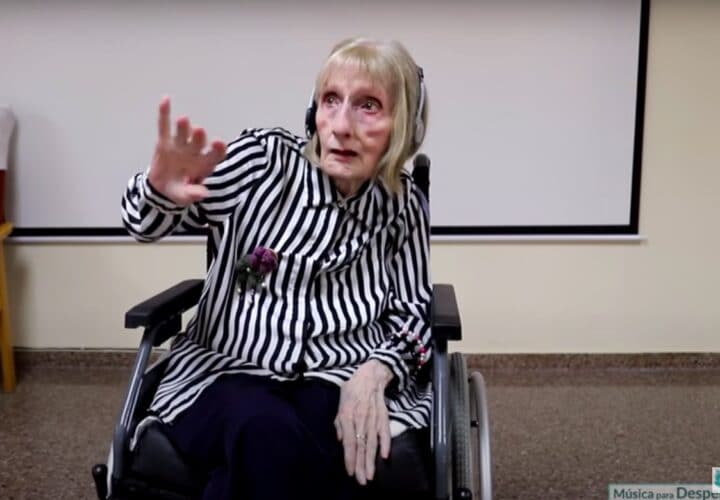Speech and language impairments are often part of the experience of dementia. Experts say targeted therapy can help people adapt as their abilities change.
Forgetting a word, struggling to find the right expression: For people living with dementia, the progressive loss of linguistic abilities can interfere with day-to-day communication and, after a point, make it difficult to maintain routines and relationships. And at some point in the disease’s progression, communication issues can combine with other cognitive problems to trigger behavioral symptoms or create a safety risk.
When language and communication become impaired by dementia, a primary care doctor may provide a referral to a certain kind of specialist: a speech-language pathologist.
According to Vicky Fukuhara, a speech-language pathologist specializing in neurological rehabilitation in adults and children, speech therapy can help older adults living with dementia find new approaches to communication, while also helping caregivers adapt to the changing abilities of their loved ones, especially as dementia progresses to the middle and late stages. She said speech therapy aims to reduce frustration and breakdowns in communication, as well as help manage behavioral issues.
Being Patient sat down with Fukuhara for a LiveTalk in which she shared some of the strategies she employs to help caregivers and their loved ones communicate as they journey through dementia.
1. Using Verbal and Physical Cues
Forgetting a word from time to time is a common part of aging. In the event of dementia, it is a regular occurrence — and that can be frustrating for both speaker and listener. Fukuhara noted that caregivers should remember, it is important to encourage people to come up with the right words independently, rather than just overtalk or correct them. Verbal and physical cues can help guide individuals toward the word. For instance, if a person has trouble finding a word like ‘apple,’ offering the first sound of the vocabulary, or a relevant phrase such as ‘golden delicious’ or ‘Fuji,’ gesturing the motion of eating an apple, or asking a set of contextual questions are all strategies that can point a person in the right direction.
2. Maintaining Reading and Writing Abilities
Talking isn’t the only way we communicate — the written word is important, too. As dementia progresses, people often experience a decline in their reading and writing skills. According to Fukuhara, speech therapy aims to preserve these abilities for as long as possible, focusing on essential vocabularies such as the names of loved ones. Tools like family photo albums can be helpful as individuals can practice by naming people in the photos.
She added that people can also incorporate tasks such as writing grocery lists and creating calendars to not only practice their reading, writing and verbal skills, but also build their own routines, which is critical to maintaining their independence to the degree possible, especially in the early stage of dementia.
3. Stimulating the Mind With Virtual Tools
Staying engaged in day-to-day activities is critical to the well-being of individuals living with dementia. To provide patients with additional activities for cognitive stimulation, Fukuhara may recommend her patients to use apps such as Tactus, which includes naming, reading, writing and comprehension exercises. As some apps may be too easy or difficult for certain patients, she said it’s best to follow the advice of a speech-language pathologist, if possible, on choosing the most appropriate app.
“Be aware that it depends on the level of where the patient is at,” Fukuhara told Being Patient. “It can be way too hard or way too simple. Go with what your speech-language pathologist recommends, if you have one.”
4. Finding Creative Avenues of Expression
Fukuhara noted that many people retain their ability to draw in the early stage of dementia. While some may have lost their childhood interest in drawing, she said art therapy can not only help individuals rediscover their creative nature but also encourage speech.
“Surprisingly enough, oftentimes drawing can be very intact, especially at the beginning part of the progression [in dementia] and some of them surprise themselves at what they can draw,” Fukuhara said of her patients. “It indirectly may bring out more language. So I love doing art, I love doing graphics with color. It helps patients also know that there are creative and colorful sides that we can tap into.”
“Music brings back memories. It brings back
good feelings. It can also facilitate language.”
Meanwhile, personally meaningful music can help people recall old memories and how they felt about past events associated with a certain song. It can lift people’s mood, and spur conversations, sing-alongs and physical movement.
“Music brings back memories,” Fukuhara said. “It brings back good feelings. It can also facilitate language.”
5. Staying Physically and Cognitively Active
According to Fukuhara, the more active people are, the more they have to talk about. This social aspect of exercising compounds the other known brain health benefits of staying active. Fukuhara urges her patients to find ways of keeping their brains and bodies moving. Sudoku and word search puzzles are good choices for cognitive stimulation. As for exercise, she recommends walking and talking with company, among other activities.
“No matter what you can or can’t do physically or cognitively or even verbally, just stay active,” Fukuhara said. “Don’t sit by and let everything pass you by. Take walks, do your garden and if you can’t stand for periods of time, get a chair out there and sit down and still enjoy what you have always enjoyed.”
UPDATE, MARCH 27, 2023: This article from April 1, 2021 was updated with new information to help our readers.



